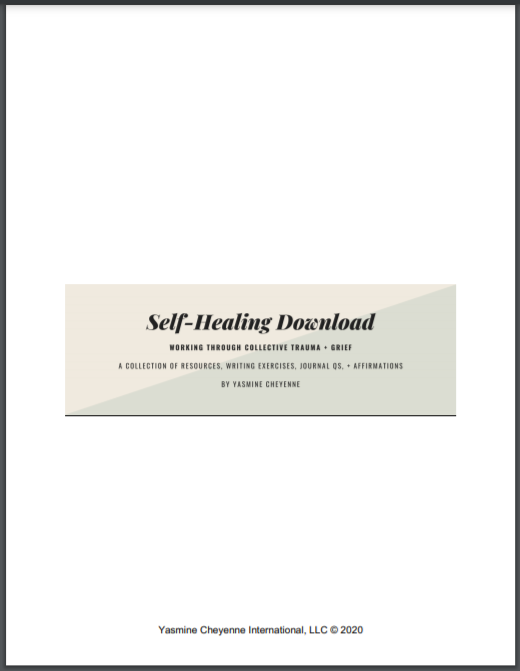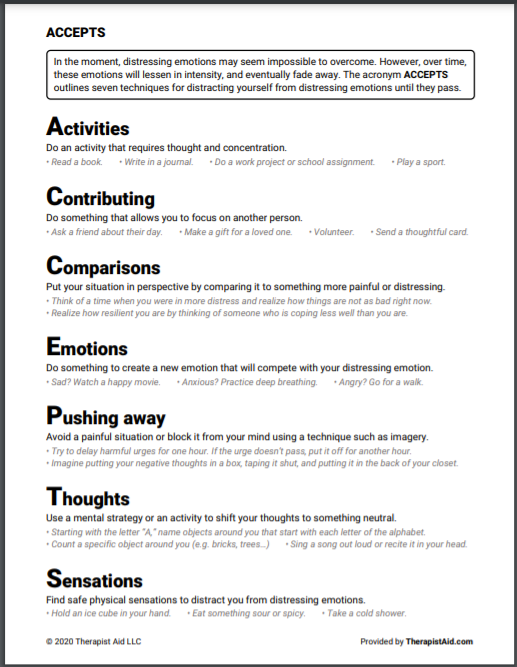Are you worried about a friend or family member but unsure of how to support them? Check out our list of resources.
Workbooks
Tolerance for Uncertainty
A guide to Accept your feelings, tolerate distress and thrive by Dr. Sachiko Nagasawa
Self Healing
Working through collective trauma and grief. A collection of resources, writing exercises, journal questions and affirmations by Yasmine Cheyenne
Distress Tolerance
Radical Acceptance (when you cannot keep painful emotions and events from coming your way by Marsha L. Linehan
For Families
When your family member experiences mental health challenges you may experience a wide range of emotions. You might feel fear, love, guilt, compassion, anger, empathy, or grief. It is very common for you to go through many emotions, sometimes all at once. This is perfectly normal and you are not alone. It is also not uncommon to experience high levels of stress, problems in relationships, and substance use as you struggle to help your family member or friend while trying to manage your own worries. Here are a few things you can do:
- Accept that the way you feel is normal and not unusual. You may be experiencing something new and have not been prepared for your young adult to struggle with mental health concerns. This does not make you a bad parent, caregiver, grandparent, sibling, etc.
- Learn more about what your relative is experiencing. Ask gently with an open mind and listen quietly. You will have a lot of questions but allow the person to gradually share more as they understand that you are there to help. If you know the young adult is experiencing depression, anxiety, psychosis, etc. find some resources to help you learn about signs and symptoms so you can figure out what is helpful (see resource listing below).
- Connect with others. Families often feel shame and embarrassment about what is happening and worry that they will be judged. It’s normal to want to isolate yourself but you do need to talk with someone. Find a trusted family member or friend or seek some professional support, either individually or in a group. There are other people who have experienced what you are going through and they can be helpful. Check out the links below for resources.
- Care for yourself. It might feel like the last thing you want to do when you are caring for your relative but the old saying is true, “You can’t help someone else unless you help yourself.” Try to get out for some exercise. It will give you some time to yourself and help you sleep better. Eat well and do something enjoyable. You will be in a better position to help your loved one if you are well.
- Plan in advance for crisis. Despite your best efforts, the young adult may experience a crisis and need some additional help. If you live in Toronto and you think your loved one is in immediate danger or you are in danger yourself:
- Call 911
- Go to the nearest hospital
- Call a crisis line or visit our crisis resource page

“At Stella’s Place there is a community of people similar to me, a community that will keep growing, and I haven’t found that anywhere else.”
-Stella’s Place Community Member
For Friends
How can I help my friend?
If you are worried about your friend having a hard time, listening is one of the best things you can do. Just knowing that someone cares is an amazing feeling. You can do things like:
- Ask them what they need from you
- Help them find support
- Spend time with them
- Go over to their place and just sit with them
- Ask them how their treatment is going
- Take them out to do something low energy and fun
How do I get my friend connected to Stella’s Place?
Once your friend is ready to get help, you can tell them about the programs offered at Stella’s Place. Please note that our services are offered to those between the ages of 16 – 29.
The first step in getting your friends connected to Stella’s Place is encouraging them to attend one of our intake and orientation sessions. More information about our intake and orientation session, as well as frequently asked questions, can be found on our programs page.
What if my friend needs help, but doesn’t want it?
If your friend is having a hard time but refusing to seek help, it can be really hard on you. It’s a common but very rough situation. There could be a number of fears or past experiences informing their decision not to get help. Many people go through a stage like this, and will seek help in their own time. The best thing you can do is to listen and be supportive of them. You can put a list of resources together, and offer to go with them to try out the resource.
How about offering support by accompanying your friend to our intake and orientation session?
With that being said, don’t forget:
You are a good friend! Even when you have to step away to take care of yourself.



